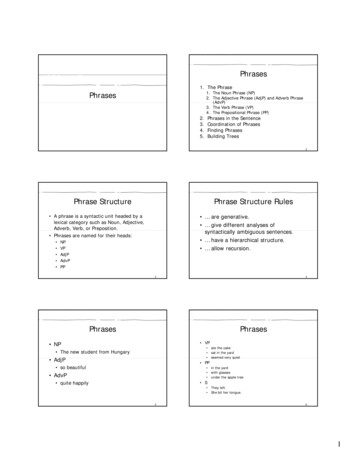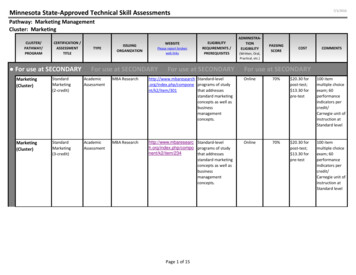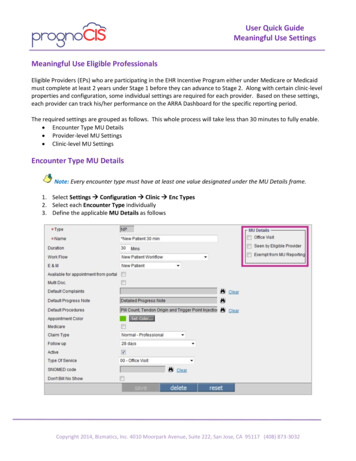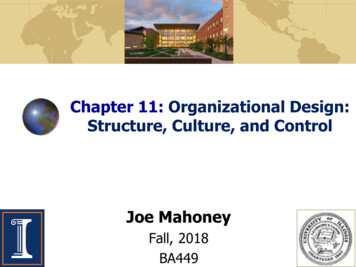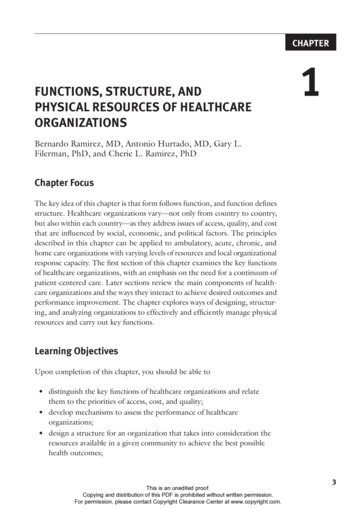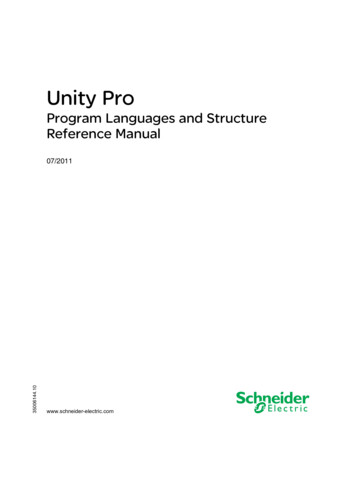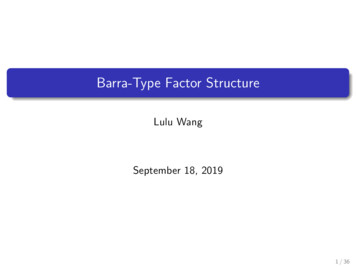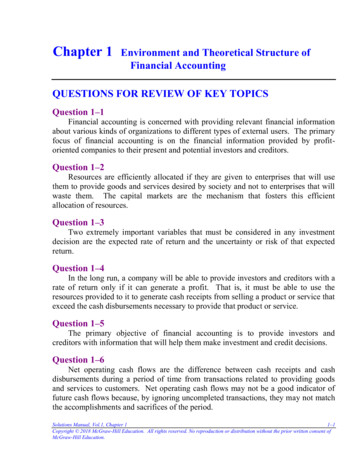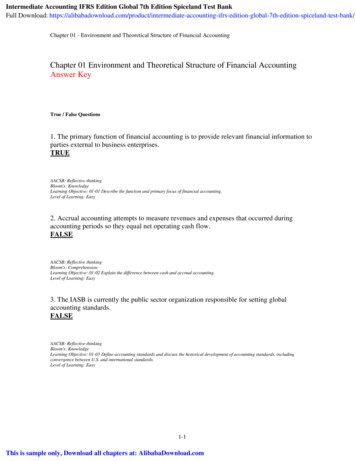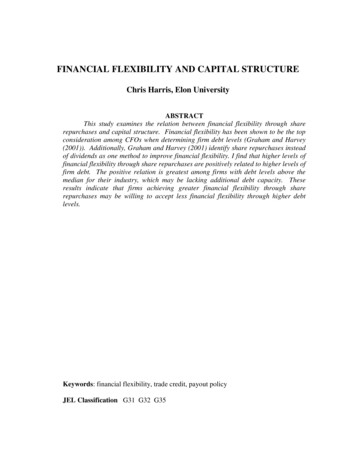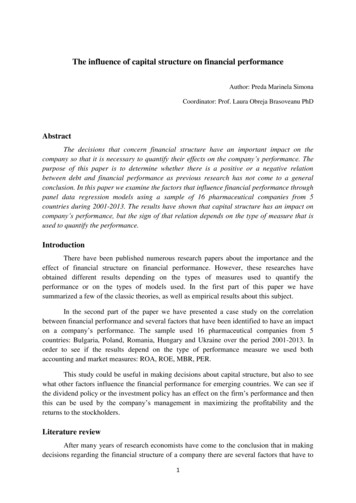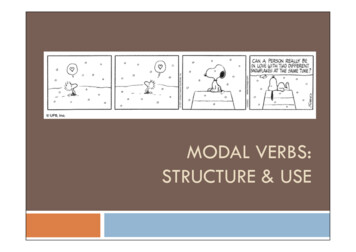
Transcription
MODAL VERBS:STRUCTURE & USE
What are modal verbs? CanCouldMayMightMustShallShouldOught toWillWouldThey are Auxiliary verbs thatprovide additional and specificmeaning to the main verb of thesentence
How do we use modals?SSubjectMVVerbExample: Mary could play the pianoThey do not accept conjugationThey do not need other auxiliary verbs
FormThere is no “s” in singularThere is no “do / does” in the questionThere is no “don’t / doesn’t” in the negativeHe can skiHe cans ski or He can skisWould you like to come with me?Do you would like to come with me?They can’t be seriousThey don’t can be serious
FormModal verbs do not have infinitives or –ing formsto can / caningto must /mustingModal verbs are followed by an infinitive without toShe must study (strong obligation)We should have gone the other way (recommendation)He could play football in his youth (ability in the past)
FormModal verbs do not have all the tensesModal verbs use other verbs to complete the tensesCan is completed with be able toMust is completed with have toThey can play the pianoThey will be able to play the piano in the futureYou must come earlyYou had to come early yesterday
What do they express?They can have more than one meaningdepending on the situations1.2.3.Single Concept Modal: they have one meaningDouble Concept Modal: they have two meaningsModals in past: They are used to express a situationin the past
CategoriesSingle conceptModalsDouble ConceptModalsModals in PastWillMightShouldOught toHad betterMayMustWouldShallCouldCanWould haveCould haveMight haveShould haveMay haveMust have
Single Concept ModalModalConceptExamplesWillFutureJoe will travel to NY next weekMightSmall probabilityI might move to Canada some dayShouldRecommendationYou should go to the doctorOught toFormal recommendationWe ought to know about first aidsHad betterWarningI had better study or I will fail the test
Double Concept ModalModalConceptExamplesMay (1)PermissionMay I come in?May (2)Good probabilityWe may visit Mexico this summerMust (1)ResponsibilityEveryone must pay taxesMust (2)AssumptionShe didn’t arrive. She must be sickWould (1)Past (used to)When I was young, I would play soccerWould (2)Present unrealI would buy the car but I can’t afford it
Double Concept ModalModalConceptExamplesShall (1)Educated expressionOfferExcuse me, I shall go nowShall I clean it?Shall (2)Contractual obligationThe company shall pay on January 1stCould (1)Unreal AbilityI could go if I had timeCould (2)Past AbilityShe could play the piano (but she can’tanymore)Can (1)Present AbilityWe can speak EnglishCan (2)PermissionCan I have a candy?
PROBABILITY/POSSIBILITYCANCAN’TShe can’t be his mum.She ‘s too youngMIGHTIt might rain tomorrowCOULDIt could rain tomorrowMAYIt may rain tomorowwMUSTShe must be his sisterbecause they lookalike.ABILITYPERMISSIONI can play thepianoCan I go outtonight?I can’t speakGermanCan I borrow thecar? No, I can’t.I could alreadyread when I wastwoCould I see yourpassport please,sir?OBLIGATION/ADVICEMay I leave thetable?You must leavebefore the clockstrikes twelve.HAVE TOI have to studytonight.SHALLYou shall pay onTuesdaySHOULD /OUGHT TOYou should see it.It’s excellent.HAD BETTERYou had bettersleep more.WOULDOFFERSShall I help you?Would you like adrink?
Modals in the PastThey are modals referred to actions thathappened in the pastMODAL HAVE verb in past participleIt must have been a difficult decisionThey should have invited her to their wedding
MODAL PERFECTUSESEXAMPLESMUST HAVE P.P.Logical conclusion on a past eventPeter has arrived late. He musthave been in a traffic jamMAY / MIGHT HAVE P.P.Deduction on a past eventJoe may / might have taken thewrong train.COULD HAVE P.P.Possibility to do something, goneunfulfilledYou could have played betterCOULDN’T HAVE P.P.Certainty that something couldn’t havehappenedHe couldn’t have passedbecause you hadn’t studiedenoughWOULD HAVE P.P.Desire to do something, butimpossibility to do it for externalcausesI would have visited you, but Iforgot your addressSHOULD /OUGHT TO HAVE P.P.Lament on something that should havebeen doneYou should / ought to havewarned me earlierSHOULDN’T HAVE P.P.Critique on something that shouldn’thave happenedHe shouldn’t have told themNEEDN’T HAVE P.P.Somthing that wasn’t necessary doingYou needn’t have bought it .
Modals-like verbs:A few verbs which often serve as modals too.They need to be conjugated.ModalConceptExampleLike toEnjoyI like to watch TVWant toDesireJohn wants to buy a carNeed toNecessityWe really needed to talk to youHave toObligationSusan had to pay the rentHave got toHave toI’ve got to go nowLook forward toFuture planI look forward to seeing you again
Practise1.My son be home by now. Where can he be?a. Have to2.b. couldc. ought tod. canb. mustn’tc. don’t have tod. had toJohn’s fallen down the stairs! I call an ambulance!a. Will5.d. couldIf you are interested in losing weight, you try this new diet.a. Could4.c. shouldI think your thumb is broken. You go to the emergency room.a. Might3.b. wouldb. mightc. mayd. ought toYou come too early. We won’t leave until 9 o’clock.a. Has tob. mustc. needn’td. can’t
Practise6.Children be accompanied by an adult at the zoo.a. Ought to7.b. mustn’tc. couldn’td. ought tob. wouldc. mustd. have toThey hear him because he was whispering.a. Wouldn’t10.d. mustn’tI can feel the heat. We be near the fire.a. Can9.c. wouldYou talk during tests. It’s forbidden!a. don’t have to8.b. mustb. mustn’tc. shouldn’td. couldn’tYou’ve never heard of Britney Spears? You be serious!a. Mustb. had toc. can’td. shouldn’t
Practise11.you like to have dinner with me tonight?a. Could12.d. wouldb. wouldn’tc. couldn’td. canI speak to the Chief Councellor, please?a. Must14.c. shouldYou let him hear about the party tomorrow. It’s a surprise!a. mustn’t13.b. mayb. Mayc. Wouldd. NeedHe has arrived late. He missed the busa. Must haveb. Should havec. Could haved. must
More practiseRe-write the following sentences using modals so that they have the samemeaning.1.I suggest that you get a good lawyer!should get a lawyerYou2.A university degree isn’t necessary for that job.needn’t have a university degree for that jobYoudon’t have to have a university 3.Perhaps my father will pick you up.may / might pick you upMy father4.4. Eating is forbidden in class!mustn’t eat in classYou
More practiseRe-write the following sentences using modals so that they have the samemeaning.5.Look at his dirty clothes! I’m sure he is a poor person.must be a poor personHe6.I don’t believe that the legend of Hercules is true because there aremany contradictions.can’t be trueThe legend of Hercules
Use your imaginationThink about these situations and create a sentence using modals.1.We are going to Paris for a weekend. (Make suggestions about things todo)2.We start school in September. (Talk about necessity)3.Margaret is a very talented sportswoman. (Talk about ability)4.You have just won the lottery! (Talk about possibility)5.Peter has got a headache and a congested nose. (Give him some advice)6.You want to borrow your uncle’s Mercedes Benz. (Ask for permissionpolitely)
Possible answers1. We could visit the Louvre / We should go up the Eiffel Tower2. We have to buy a new notebook3. She can speak 3 languages! / She is able to play the piano and the violin4. I might stop working / I may buy a new car / I can travel to New York5. You should see a doctor / You ought to drink hot tea6. Can I borrow your car, please? or May I borrow your car, please?
Double Concept Modal Modal Concept Examples Shall (1) Educated expression Offer Excuse me, I shall go now Shall I clean it? Shall (2) Contractual obligation The company shall pay on January 1st Could (1) Unreal Ability I could go if I had time Could (2) Past Ability She could play the piano(but she can’t anymor
